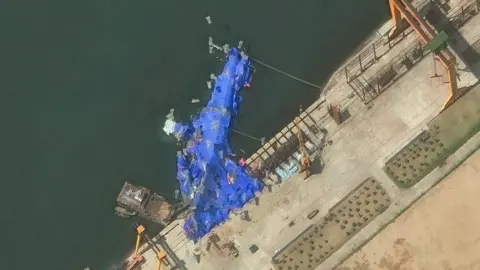North Korea arrests senior official over warship launch failure
 Getty Images
Getty ImagesNorth Korea has arrested a fourth official over the failed launch of a new warship that has enraged the country's leader, Kim Jong Un.
Ri Hyong-son, deputy director of the ruling Workers' Party's Munitions Industry Department, was "largely responsible for the serious accident" last week, state-run news agency KCNA said on Monday.
The 5,000-ton destroyer had tipped over and damaged its hull, in what Kim described as a "criminal act" that "severely damaged the [country's] dignity and pride".
The vessel is being repaired under the guidance of an expert group, KCNA said.
Mr Ri, who is part of the party's Central Military Commission, is the highest level official arrested over the incident so far.
The commission commands the Korean People's Army and is responsible for developing and implementing North Korea's military policies.
Over the weekend, Pyongyang also detained three officials at the northern Chongjin shipyard, where the destroyer was built and where its launch failed.
The officials were the chief engineer, its construction head and an administrative manager.
Kim earlier said Wednesday's incident was caused by "absolute carelessness, irresponsibility and unscientific empiricism".
It is not clear what punishment they might face, but the authoritarian state has been known to sentence officials it finds guilty of wrongdoing to forced labour and even death.
It is uncommon for North Korea to publicly disclose local accidents, though it has done this a handful of times in the past after failed satellite launches.
Some analysts believe Kim's swift and severe response was meant as a signal that Pyongyang will continue to advance its military capabilities.
While such criticism is "not surprising" for a dictatorship, it is unusual that state media is openly reporting it, says Chun In-bum, a former commander of South Korea's special forces.
"I fear this might be a sign of confidence and a show of resilience," he says.
"With this new line of ships, North Korea seems to intend on challenging the sovereignty of the South in earnest."
Michael Madden, a North Korea expert from the Stimson Center in Washington, sees Kim's response as a sign of the "high priority" his regime is putting into developing warships.
The mishap may have resulted from officials "trying to do too much at once", he notes, saying that "there seems to have been an unusual amount of internal pressure on the personnel and production units to get this all done".
Last week's shipyard accident comes weeks after North Korea unveiled a similar warship in another part of the country.
Kim had called that warship a "breakthrough" in modernising North Korea's navy and said it would be deployed early next year.
